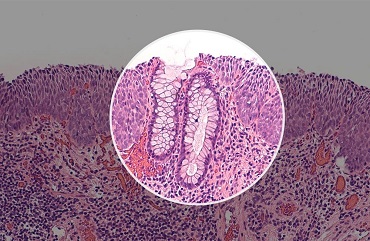COVID-19 News - SARS-CoV-2 - Anal Dysplasia May 22, 2023 2 years, 7 months, 4 days, 13 hours, 16 minutes ago
COVID-19 News: The SARS-CoV-2 virus, responsible for the COVID-19 pandemic, has impacted millions of lives worldwide. While the virus primarily targets the respiratory system, emerging research has revealed that it can also affect other organs and tissues in the body. One area of particular interest is the potential link between SARS-CoV-2 and anal dysplasia, a precancerous condition that may lead to anal cancer.
 Understanding Anal Dysplasia
Understanding Anal Dysplasia
Anal dysplasia is a condition characterized by the presence of abnormal cells in the lining of the anal canal. It is a precancerous condition that can progress to anal cancer if left untreated.
Human papillomavirus (HPV) is the primary cause of anal dysplasia and is considered a sexually transmitted infection. Studies have also shown that HIV infections can also lead to anal dysplasia in some individuals
It is important to investigate whether other viruses, especially the SARS-CoV-2 virus which has affected billions and is still reinfecting millions, could play a role in the development of this condition.
The SARS-CoV-2 Virus And Its Effects On The Body
SARS-CoV-2 is a novel coronavirus that primarily affects the respiratory system, causing symptoms such as fever, cough, and difficulty breathing. However, studies have shown that the virus can also infect cells in other organs, including the gastrointestinal tract. Researchers have found that the virus enters cells using the angiotensin-converting enzyme 2 (ACE2) receptor, which is also present in the cells lining the gastrointestinal tract, including the anal canal. This raises the question of whether SARS-CoV-2 could cause anal dysplasia.
Furthermore, we now have validation through various studies about the persistence of the SARS-CoV-2 virus in the gastrointestinal tract plus many other previous studies have shown that fecal samples from so called COVID-19 ‘recovered’ individuals and post-COVID individuals also contain traces of active replicative infectious samples of the SARS-CoV-2 virus.
https://www.ncbi.nlm.nih.gov/pmc/articles/PMC7454471/
SARS-CoV-2 Virus Ability To Remain In The Gastrointestinal Tract And Viral Persistence
Studies have already confirmed the persistence of the SARS-CoV-2 virus on the mucous membranes of the gastrointestinal tract and the virus is able to suppress and impair immune responses there so that it can persist as reservoirs there for long lengths of time as covered in previous
COVID-19 News articles.
https://www.thailandmedical.news/news/breaking-covid-19-news-millions-unknowingly-harbor-sars-cov-2-in-their-gut-with-viral-persistence-contributing-to-long-covid
Studies Show That SARS-CoV-2 Can Cause Lesions and Other Damage To The Gastrointestinal Tract.
One past Italian study focused on the endosco
pic and histologic findings of 38 COVID-19 patients. Interestingly, the most common indication for endoscopy was GI bleeding. Esophagogastroduodenoscopy (EGD) of 24 patients and colonoscopy of 20 patients revealed that 70%-75% of the cases had active lesions!
https://www.cghjournal.org/article/S1542-3565(20)30752-7/fulltext
Many other studies have also showed that SARS-CoV-2 can cause lesions on various parts of the gastrointestinal tract.
https://journals.lww.com/acgcr/fulltext/2020/09000/covid_19_and_the_gastrointestinal_system__lesions.4.aspx
Studies have also showed that the SARS-CoV-2 virus can also cause damage and abnormality to the cells of the intestinal in a variety of ways as well and not just cause lesions.
https://www.frontiersin.org/articles/10.3389/fmicb.2022.860931/full
https://www.nature.com/articles/s41385-021-00437-z
https://bmjopengastro.bmj.com/content/8/1/e000578
https://link.springer.com/article/10.1007/s15010-022-01769-z
This is one reason why we are also witnessing lots of various gastrointestinal issues in many post-COVID individuals.
https://www.sciencedirect.com/science/article/pii/S0753332220312567
https://www.health.harvard.edu/blog/can-long-covid-affect-the-gut-202303202903
https://newsnetwork.mayoclinic.org/discussion/long-covid-and-the-digestive-system-mayo-clinic-expert-describes-common-symptoms/
https://www.uptodate.com/contents/covid-19-gastrointestinal-symptoms-and-complications
Incidences Of Anal Dysplasia And Anal Cancer Rising In The Last Few Years.
The incidence of high grade anal dysplasia and anal cancers are rising over the last two years..while many reports tend to attribute HPV, HIV and other factors to the rise, no groups have investigated whether the SARS-CoV-2 is also a contributing factor.
https://ascopubs.org/doi/10.1200/JCO.22.01390
https://academic.oup.com/ofid/article/9/11/ofac556/6768038
https://pubmed.ncbi.nlm.nih.gov/36467302/
Studies Showing That SARS-CoV-2 Can Cause Neoplasia Or Its Progression By Immune Suppression.
One past study suggested that SARS-CoV-2 could cause the progression of cervical intraepithelial neoplasia thru its immune suppression actions.
https://www.sciencedirect.com/science/article/pii/S0165037822002923
This study findings also has implications in the case of anal dysplasia.
Detailed Studies Warranted.
To date, there is limited evidence on the potential link between SARS-CoV-2 and anal dysplasia. Most studies have focused on the virus's impact on the respiratory and gastrointestinal systems, with few directly addressing anal dysplasia.
With studies showing that SARS-CoV-2 infections and viral persistence causing constant chronic inflammation, the ability for anal dysplasia to develop is very high.
A few undocumented case reports describing patients with COVID-19 who developed anal cancer during the course of the infection or whose colorectal infections progressed rapidly due to COVID-19 made a few oncologists to speculated that the SARS-CoV-2 virus could have contributed to the development and/or progression of the cancer, but further research is needed to confirm this hypothesis.
To date however there no studies that provide definitive proof of a causal relationship between the virus and anal dysplasia, and further research is needed to establish whether such a connection exists. Urgent studies are warranted to explore and investigate the potential mechanisms through which SARS-CoV-2 could cause anal dysplasia, including the role of inflammation, immune system dysregulation, and direct viral infection of anal canal cells.
For the latest
COVID-19 News, keep on logging to Thailand Medical News.
